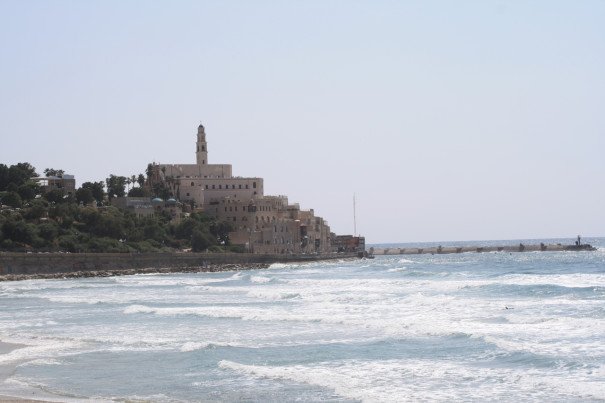
Dispelling Misconceptions, One Meal at a Time

Dispelling Misconceptions, One Meal at a Time
Stuffed Cabbage in Jaffa
The muezzin’s plaintive cry had barely sounded before the family pounced on the food. Since their arrival in the hour before sunset, the aromas of Myassar Abu Shehata Seri’s outdoor kitchen tormented the weary fasters. Although I had eaten before making my way to Jaffa, I, too, was famished from watching her cook.
It was one of the last few days of Ramadan and Seri had invited me to join her family for iftar, the break-fast meal at sundown. Like at the Purim feast, Muslims consider hosting guests and family for the meal a mitzvah, and it was my honor and privilege to sample Seri’s exquisite Jaffa food.
Jaffa, which served as the principle seaport in historic Palestine for centuries, has a culinary tradition which differs from that of the hinterland. Arabs of the Galilee concoct dishes rich with greens, such as mallow, tumble thistle, and jute, and laden with beef or lamb. Stuffed vegetables and meat are a staple. Jaffa’s cuisine, on the other hand, features abundant spices and a profusion of seafood.
Seri spearheaded the Arab culinary scene in Jaffa, starting with selling prepared food at Tel Aviv’s Dizengoff Center. She moved on to hosting cooking workshops and recently published a Jaffa cookbook, covering everything from pickles to soup to desserts and garnished with anecdotes and photos of her hometown. “Recipes and tales” is bilingual, catering to both Hebrew and Arabic speakers, and she plans to launch an edition in English and Arabic as well.
Wearing a long blue robe and black headscarf, Seri welcomed me into her home not far from the old city on the Mediterranean. In the sweltering humid heat of late June, she’d moved her kitchen into the courtyard, with a gas cooktop, oven, sinks, and counters in the open air.
Accompanied by one of her seven siblings and her niece, Seri was already cooking by the time I arrived. A platter of green bell peppers stuffed with fragrant spiced rice cooked with ground beef, lamb, chickpeas, and tomato was ready to go in the oven. Brilliant green broad beans were simmering in a tomato sauce and cabbage was boiling, soon to be stuffed with rice. Her mother watched Egyptian soap operas on a flat screen television in the corner while plucking purslane leaves for a salad, her three-year-old great-granddaughter snacking on carrot sticks at her feet.
“I learned to cook from my mother when I was 13,” she said, taking a momentary respite from cooking. Though her specialties are the foods she grew up with, her curiosity has driven her to explore other cuisines. “I cook cholent, kreplach, Iraqi kubbeh, anything,” she said, rattling off a slew of traditional Jewish dishes. Her mission, she said, was to teach Israelis that Arab food “isn’t just hummus and fava beans.”
Ramadan, she explained, was in some ways similar to Shabbat for Jews. “Just like with Jews, for Shabbat they make special food,” she set, checking up on a pot of artichokes and lamb. “That’s how it is with us for Ramadan.” The difference is that it’s every day for a month. For that reason, Arab news outlets always publish articles on how not to gain weight during the holy month.
As the courtyard filled with Seri’s extended family, a massive table was set and the dishes laid out in all their aromatic glory. The family sat down. Minutes of idle chatter filled out the last few minutes of the fast. It was like the final moments before the end of Yom Kippur.
After hours of anticipation, with the sun dipping behind the Mediterranean, the call to prayer rang out from a nearby mosque. Two dozen hands immediately descended upon the platters of roasted chicken with spiced rice, lamb and beans simmered in tomato sauce, and tender bulgur with chickpeas and carrots.
Ismail, Seri’s nephew who studied at the University of California, eyeballed the heap of stuffed cabbage prepared by his grandmother as the whole clan sat down.
“Bro, you can either talk or eat up, but I can’t guarantee there will be anything left,” he said when I tried to make polite conversation.
Taking his lead, I lunged at the stuffed cabbage first. The leaf dissolved in my mouth and the rich rice followed suit. The roasted chicken thigh was juicy and smoky at the same time, the mountain of rice imbued with the holiday warmth of nutmeg and allspice. Although I was already sodden with perspiration from the sultry coastal air, I slurped some of the chicken soup with cracked wheat; it was an elixir to cure all ills, far heartier than American chicken noodle.
For dessert, slices of ice cold watermelon and mixed nuts were just the start. Seri and her sister both prepared traditional holiday shortbread cookies filled with a date paste known alternatively as ka’ak or ma’amoul. To say they’re addictive does them injustice.
On the way back to Jerusalem, I had much to digest. Seri’s meal dispelled my misconception that Ramadan was like Jewish fasts, just a month long. It was more celebratory than mournful, as Judaism’s fasts tend to be, and unlike Tisha B’Av or the Fast of Esther for example, it’s observed by secular and religious alike.
What I was certain of was that I needed more material for my research and that it was another 11 months until Ramadan.
Photo: Jean & Nathalie